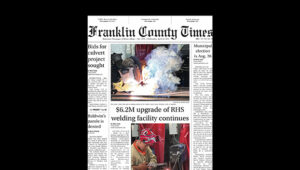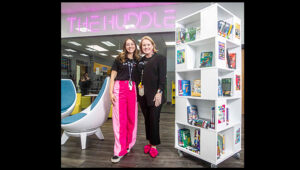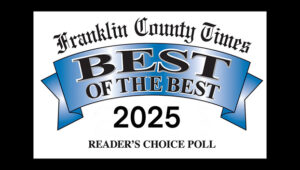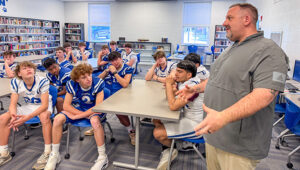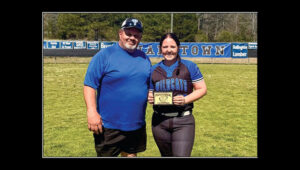STATE OF EDUCATION: WHERE WE’RE GOING – Innovation is the key for future classrooms
Natalie Bendall, the curriculum director for Russellville City Schools, believes the future of helping students achieve skills is focusing on student-centered learning with innovative practices.
“I think student-centered and innovative are the two descriptors for the future of education,” Bendall said. “With the increase of AI, it has given us the ability to make student-centered learning more impactful and feasible inside and outside of the classroom.”
For example, she shared that one AIbased program for the classroom provides a practice tool for students to use instead of worksheets.
With the tool, if a teacher is working with students in small groups, a student working independently who gets stuck on a math problem can ask the program for help.
Not only will the problem be explained to the student, but the AI-based tool will generate additional practice for the student that targets the area where he or she was stuck.
“These programs give us tools centered around the exact needs of each student,” Bendall emphasized. “We want to harness those things, because it’s really about helping them learn in their own way.”
Bendall said she hopes to implement the use of a new tool called Google Notebook LM, too.
This program, she said, would allow a teacher to upload a PDF of lesson notes or slides, then it creates a podcast of two people discussing the content that was submitted.
“It doesn’t just read the PDF — it creates a conversation,” Bendall said. “If a history teacher, for example, uploaded their notes, students could listen to a podcast on the way home, which would help those who struggle with reading the content.”
Additionally, Bendall said she wants to learn to use AI to make teacher’s lives easier through the creation of automated notes, lesson plans and even tests.
“We can’t continue to teach the way we’ve always taught, because our kids are changing and the world is changing,” she said. “I think we can harness the power of AI for good with the right motives.”
Joel Andrews, Russellville City Schools’ technology director, agrees that with AI, the possibilities are endless.
Currently, he is working to develop an AI policy for the district, which will guide educators and students on the use of AI as an educational tool.
Additionally, Andrews hopes to begin transitioning the elementary and high schools’ libraries into state-of-the-art multi-media centers, like “The Huddle,” the newly designed space at Russellville Middle School, which contains 3D printers, a sound booth, an Esports space and more.
“We want to put resources at the elementaries to feed into students’ abilities when they arrive at the middle school,” he explained. “Then get that technology at the high school, so when they leave eighth grade, they aren’t stuck in a silo with less advanced technological and digital resources.”
Russellville City Schools’ Superintendent Tim Guinn stressed that through any changes, growth or innovation, the district will continue “to be a school system of excellence, impacting the lives of every student in our schools.
The goal, he said, is to ultimately impact the Russellville community, the state and eventually, the world.
To achieve that impact, Guinn shared that he is constantly speaking with other educators about updates to the district’s career tech and workforce development offerings.
“We want to look at where we see a need locally and in the United States,” he explained. “Do we need engineers, scientists, accountants?
“We want to continue to expand in ways that will make the most difference.”
Russellville High School Principal Lt. Col. Norman Lier agreed that the district is “constantly looking to see what’s out there and what we can offer to our kids.”
He said that he hopes to bring back the career tech center’s cosmetology department and offer a drafting program. Both could be offered as soon as the 202526 school year.
“I want us to help our students develop their dreams and give them the skills to pursue them,” Lier emphasized.
Across the Franklin County Schools’ district, Superintendent Greg Hamilton said that first and foremost, the focus will be on continued improvement of academics.
He said that he hopes programs and policies currently in place, like a weekly academic tutoring program, will continue to push his district forward with success.
The program, implemented in the fall of 2024, provides students of all ages, at every school in the system, to receive individualized tutoring in any subject area they need it.
Hamilton said that this program, which generally takes place after school on Wednesdays, has led to academic growth in every school, and he wants to see it continue to grow.
However, outside the realm of academia, he noted that facility upgrades are next on his agenda.
“Facilities are our number two target area and have been for the eight years I’ve been superintendent,” Hamilton stressed.
He noted that a $3 million gymnasium was just completed at East Franklin Junior High School.
Now, he is awaiting pre-construction meetings for upgrades and additions at Red Bay High School and Elementary School.
“We will have a new ADA compliant entrance to the elementary school,” Hamilton explained. “We’re also adding classrooms and administrative offices at the high school.”
Additionally, he said a series of athletic field upgrades are currently underway.
While two football fields, two baseball fields and one softball field have been resurfaced, another three softball field resurfacing projects are out for bid.
“We’ve got facilities projects at all of our campuses, and more are waiting,” Hamilton shared. “We’re trying to take a little bit on every year.”
Hamilton said that when Amendment 1 passed during the November election, it was “divine intervention.”
He explained that with the school district able to control the property it owns outside the county, funds can be generated to benefit the school system, which has a high poverty rate.
With the funds and the continued efforts toward academic achievement, Hamilton said he “looks forward to a continued rise” in his district’s goals.
Read the rest of this year’s Progress – Progress 2025.




